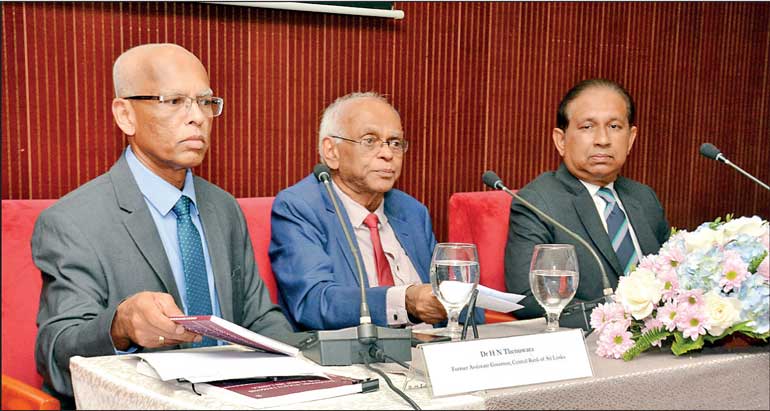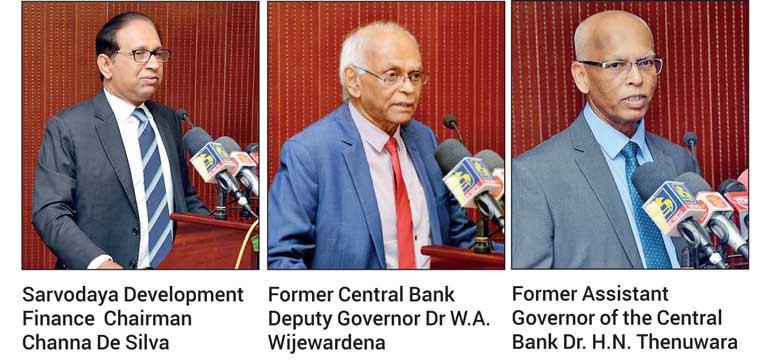Tuesday Feb 24, 2026
Tuesday Feb 24, 2026
Wednesday, 15 January 2025 00:00 - - {{hitsCtrl.values.hits}}

Former Central Bank Assistant Governor Dr. H.N. Thenuwara, Former Central Bank Deputy Governor Dr. W.A. Wijewardena, and Sarvodaya Development Finance Chairman Channa De Silva at the head table – Pix by Upul Abayasekara

By Janani Kandaramage
Central Bank’s ex-Assistant Governor and Economic Research Director and University of Iowa presently Adjunct Professor Dr. H.N. Thenuwara recently unveiled the contents of his latest book titled ‘Economic Policy Lessons for a New Sri Lanka,’ for comments and suggestions to a select audience in Colombo.
It comprises 12 essays analysing the present state of the Sri Lankan economy providing policy guidelines. Four of these are updated versions of articles which he had published earlier in news media, while the other eight are new analyses presented to readers for the first time. All of these demonstrate his wealth of experience as a Central Banker for over three decades, and a university lecturer who has had active interaction with economic enthusiasts for about one and a half decades.
Sri Lanka is noted for missing opportunities in its colonial and post-independence era. The book examines the lessons learned from failing to capitalise on the five industrial revolutions that occurred around the world over the years. It offers a strategic roadmap for transitioning directly from the second industrial revolution-characterised by mass production and the advent of electricity – into the ground-breaking realms of the fourth and fifth industrial revolutions harnessing artificial intelligence, automation, and internet developments.
The book further describes the opposing economic trajectories embarked by Sri Lanka and its counterpart Singapore respectively since independence, asserting that while Singapore emerged successful with its policies, Sri Lanka became a laggard as corruption continued to dominate. Dr. Thenuwara identifies misaligned monetary and exchange rate policies as the key drivers of Sri Lanka’s recent economic crises. He outlines potential pathways for recovery, emphasising the critical duty of the state and its functions for enabling this process while exploring key topics including agriculture, the wage-price spiral, as well as the responsibilities of the Central Bank in releasing the country from catastrophe. Commenting on Dr. Thenuwara’s wealth of experience, Sabaragamuwa University of Sri Lanka Board Member Faculty of Graduate Studies W. A. Wijewardena remarked: “Dr. Thenuwara had been a close associate of mine during my tenure at the Central Bank spanning over 35 years. Out of all the many economists in the Central Bank, there is a uniqueness to Dr. Thenuwara as he never hesitated to speak his mind even when they contradicted popular opinion of the Central Bank.”
“When he was the Director of Economic Research of the Central Bank in the early 2000s, when the inflation rate was running at a high 20%, it was he who submitted all the relevant research material to the Monetary Policy Committee which met every two weeks in those days. We prepared a board paper to be submitted to the Monetary Board, recommending that the Central Bank should tighten its monetary policy which was disapproved by many. Fortunately, because of the governor at the time disagreements were dissuaded and Dr. Thenuwara’s recommendations were considered. During that period, he was instrumental in doing the foundational research for the adoption of an inflation targeting framework in the Central Bank, crucial in maintaining price stability,” he highlighted.
Reviewing the book, LankaPay CEO Channa De Silva praised the book for blending the practicality of economics with the challenges of economics, theory of economics and the implications of economics. Reflecting on Dr. Thenuwara’s incorporation of Albert Einstein’s famous phrase, ‘ those who have the privilege to know have the duty to act,’ De Silva noted, “ This phrase in particular resonates with Sri Lanka as many in the state and public refrain from questioning political and economic systems and simply voicing their opinions, hindering discourse on major issues facing the country. This is problematic as this has led to 76 years of deprivation, corruption, inefficiency, unrest, and bankruptcy that have hindered the country from utilising its full potential.”
“This lack of economic development can be evidenced with 26% of the Sri Lankan population living below the poverty line of $ 3 or Rs. 900. Despite being strategically positioned as an island nation, our country has struggled in creating an environment with equitable access to essential goods,” he opined.
The book, he says, outlines the responsibilities of the Government in facilitating development via infrastructure focus, law and order, as well as enhanced educational and healthcare opportunities promoting discipline and progress in all facets of life crucial for economic growth. He also compared Sri Lanka’s precarious state to a hazardous bus driver, with no sense of direction, claiming that if developmental strategies are not acted upon it will only leave the public at the edge of their seats anticipating the worst.
In his closing address Dr. Thenuwara dived into his writings, spotlighting the major crisis of ‘brain drain’ threatening the island. He labelled countries such as the US, Canada, Australia, and the UK as the top migration hotspots in the world, with many migrants from developing countries including Sri Lanka. He stressed that the Government as well as the private sector must collaborate to enhance job opportunities that coincide with the skills and requirements of today’s world or else western countries will continue to absorb local talent.
Speaking about the ninth chapter of his book that explores the role of the Government and policies for a new age, Dr. Thenuwara referred to market creation, market promotion, market stabilisation, market regulation, and market legitimisation. He called market creation the first step to ensuring a suitable environment is created for economic activity free from corruption followed by market promotion which refers to facilitating economic growth through market expansion and greater public goods. While market stability focuses on ensuring that the public and private sector remain on the path to progress, market regulation will limit the social costs on the economy through regulations on monopolies, health precautions, and procedures investigating corruption. According to him, Sri Lanka is ranked 115 out of 180 countries in the Corruption Perception Index of last year, heightening calls for action to address these fundamental loopholes. Market legitimisation will strengthen institutional frameworks and resolve any principal-agent problems between the state and the people.
As W.A. Wijewardena mentioned, “Students of economics, policymakers, and those in economics careers can greatly benefit from this book which is rich with straightforward and honest critical economic analyses.”